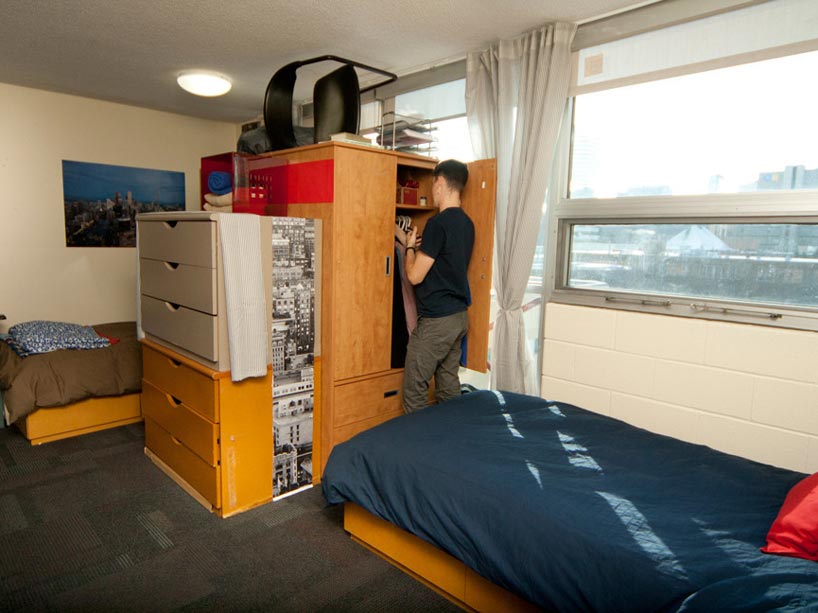Student focus groups weigh in on university housing

This double room at Pitman Hall is an example of the most popular student housing option, due to its affordability. StudentDwellTO, a research partnership between Toronto’s four universities, is analyzing student housing options with a goal to provide better options in the future.
Do housing options affect university student lived experiences, including grade point average (GPA) and graduation? This is a question StudentDwellTO (external link) , a research partnership between Toronto’s four universities, has set out to answer. As part of the project, researchers from Ryerson University, University of Toronto, York University and OCAD University conducted 26 student focus groups in Toronto on six university campuses. The answer they got was – yes.
“Students are more successful in persisting to graduation from university if they live in residence, and in specific types of room arrangements in that residence,” said Shelagh McCartney, a professor in Ryerson’s School of Urban and Regional Planning, and the university’s research lead for StudentDwellTO.
“It is when they are in residence that they are interacting with other students, building supportive relationships and psychosocially developing. These experiences of home affect graduation rates and GPA. As an architect and planner, I consider linkages between these aspects of university experiences to types of physical living spaces. They strongly link,” said McCartney.
The focus groups were conducted to provide a greater understanding of what student experiences are, as well as their preferences and choices. Findings revealed that housing insecurity in the GTA is not only challenging to student success but that students are often marginalized in the search. “Everyone talks about students in literature on university housing, but very few projects include the student voice. StudentDwellTO does,” said McCartney.
Preliminary findings from the focus groups show:
- Affordability is a major factor in a student’s decision about housing: students in the focus groups pay an average of $924 per month in rent, and many students have chosen their university and courses based on commute times, due to their need to live at home while studying in order to save money;
- Students want more affordable on-campus housing options: McCartney and her Ryerson team noted that at many Toronto university residences, the cheapest residence rooms are the first to be spoken for, leaving limited options for low-income students. Low-income students suffer disproportionately from the general housing precarity that students face;
- Students are looking for support: students that are forced to look off-campus for housing experience competition, overcrowding, shortages and predatory landlords. They are looking for guidance in dealing with these factors, while also being proactive in finding solutions to their housing issues;
- Students are looking for physical and mental relief: they are tired from commuting to early classes and generally feel stressed and over-stretched from precarious housing options. This causes them to be disengaged from campus experiences and can lead to feelings of isolation;
- Students want housing options with common areas and study spaces: McCartney’s research indicated that private space per student is increasing and public space is decreasing, which can contribute to lack of peer interactions, lack of academic integration and lower overall academic self-efficacy.
The student focus group phase was the first phase in the multi-layered project that involves more than 100 students and faculty. The next step is to analyze anonymous data that has been collected from a diverse selection of students across all four universities and compare it to the focus groups.
StudentDwellTO researchers plan to release more findings in the coming months, which will give universities and policy makers more information to guide planning decisions. McCartney puts it simply: “Our hope with this project is to give universities the information they need to make university housing decisions moving forward and advocate for governmental policy change.”
